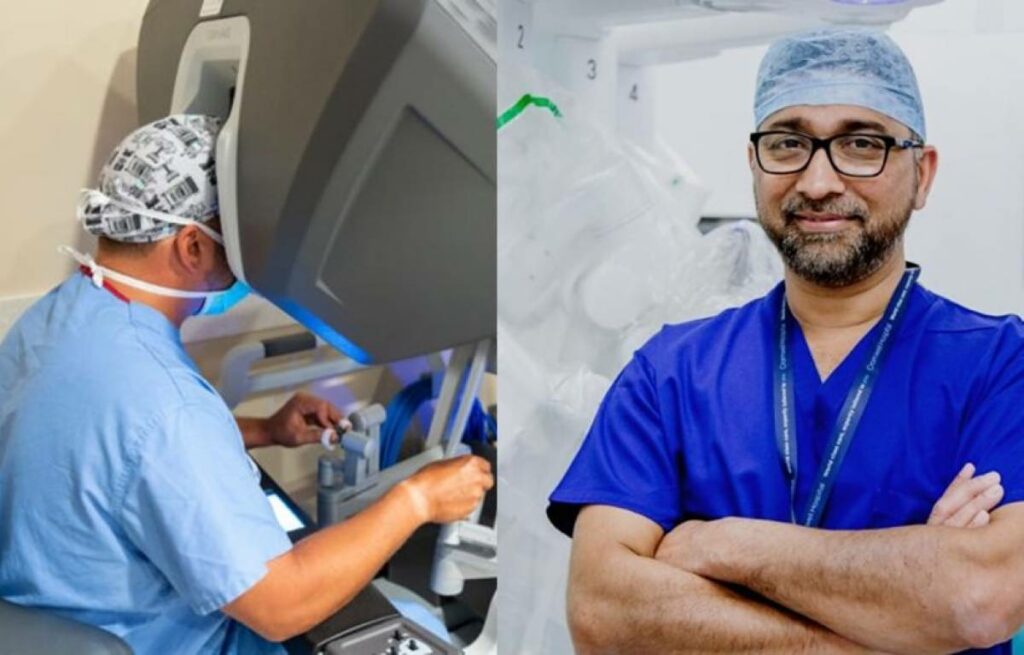Robotic surgery has emerged as a groundbreaking technique in the field of medicine, revolutionizing surgical procedures worldwide. Among the pioneers of this innovative approach is Pakistani surgeon Dr. Amer Raza, who has made significant contributions to advancing the use of top-notch robotic systems in complex operations. Dr. Raza recently achieved a remarkable feat by performing 12 successful surgeries, setting a world record in the process.
With the assistance of the Da Vinci surgical robot, he treated women suffering from endometriosis, a condition where tissue similar to the lining of the uterus grows outside the uterus. Dr. Raza’s expertise in laparoscopic surgeries and his position as a leading surgeon in endometriosis have further propelled his success.
The Role of Robotics in Medicine
Robotic surgery, with its cutting-edge technology and precision, offers numerous advantages in the field of medicine. This state-of-the-art approach allows surgeons to perform complex procedures with enhanced dexterity, control, and visualization. The Da Vinci surgical robot, in particular, has gained prominence for its ability to assist surgeons in performing minimally invasive surgeries with utmost precision.
Improved Strategic Planning
Dr. Amer Raza and his team have revolutionized the strategic planning involved in surgical procedures, particularly in the context of addressing the challenges posed by the stretched waiting times resulting from the COVID-19 pandemic. Leveraging the latest technology, their innovative approach enables surgeries to be conducted more efficiently, thus optimizing the utilization of resources and reducing patient waiting times.
Enhanced Efficiency and Time Management
By employing robotic assistance, surgeries can be performed more expeditiously, leading to improved efficiency and time management. Dr. Raza and his team have devised a meticulous care model that allows them to complete operations in a relatively shorter duration, benefiting both patients and healthcare providers. The use of robotic systems streamlines the surgical process, thereby reducing the overall time spent in the operating room.
Reduced Blood Loss and Faster Recovery
One of the notable advantages of robotic surgery is the reduction in blood loss during procedures. The precise control offered by robotic systems enables surgeons to minimize bleeding, ensuring a safer surgical environment for patients. Additionally, this advanced technique contributes to shorter recovery periods, as it minimizes trauma to the body compared to traditional open surgeries. Patients who undergo robotic-assisted procedures often experience less post-operative pain and a quicker return to their normal activities.
The Future of AI and Robotics in Medicine
The emergence of artificial intelligence (AI) and robotics has paved the way for transformative changes in the field of medicine. The synergy between these technologies holds immense potential for enhancing patient care, augmenting surgical precision, and optimizing healthcare delivery. Here are some key areas where AI and robotics are poised to make a significant impact:
- Surgical Precision and Automation: AI-powered robotic systems can assist surgeons by providing real-time feedback and guidance during procedures. This technology enables highly accurate and precise movements, reducing the risk of errors and improving patient outcomes.
- Telemedicine and Remote Surgery: Robotics, in combination with AI and telecommunication technologies, can facilitate remote surgeries and telemedicine consultations. This advancement has the potential to revolutionize healthcare delivery, particularly in underserved areas where access to specialized medical expertise is limited.
- Data Analysis and Predictive Analytics: AI algorithms can analyze vast amounts of medical data, assisting healthcare professionals in making informed decisions. Machine learning models can identify patterns, predict disease progression, and recommend personalized treatment plans, leading to improved patient management and outcomes.
- Training and Education: Robotics and AI can play a pivotal role in medical education and training. Simulated surgical environments can provide aspiring surgeons with hands-on experience and allow them to practice complex procedures in a safe and controlled manner.
- Precision Medicine: The integration of AI and robotics can contribute to the development of personalized treatment approaches based on a patient’s unique characteristics. This tailored approach holds promise for more effective and targeted therapies, improving patient response and reducing adverse effects.
Dr. Amer Raza, a Pakistani surgeon, has made remarkable strides in the field of robotic surgery, setting a world record and contributing significantly to the advancement of surgical techniques. Robotic surgery, powered by cutting-edge technology, offers numerous benefits such as enhanced precision, reduced blood loss, and faster recovery times. Looking ahead, the integration of AI and robotics holds immense potential to revolutionize medicine by enabling surgical precision, remote healthcare delivery, data analysis, training and education, and personalized medicine. The continued collaboration between medical professionals and technology experts will drive further innovations and improve patient care worldwide.
Read More:





 Google and Pakistan Join Forces to Empower IT Education and Foster Digital Growth
Google and Pakistan Join Forces to Empower IT Education and Foster Digital Growth